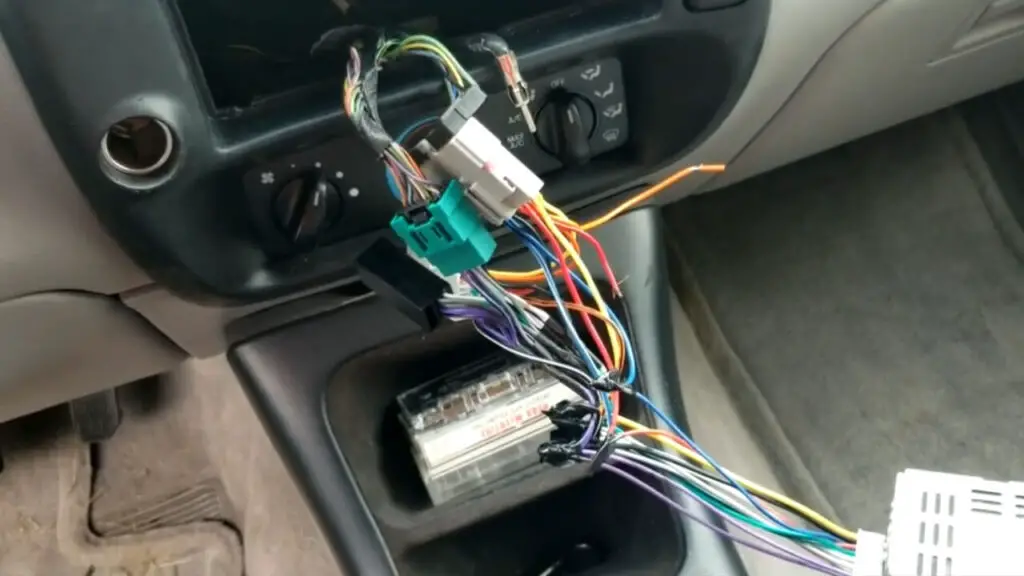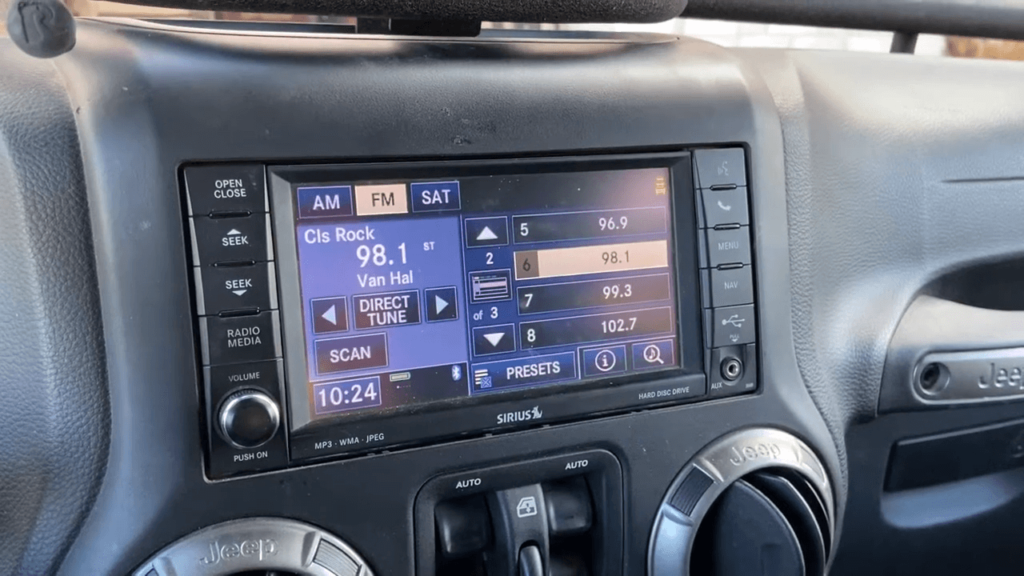Have you ever gotten into your Jeep, ready for a long drive, turned on the radio, and found the Jeep radio not working? For sure, more than one-third of all Jeep owners have experienced radio issues in their vehicles. And it can be frustrating when you just want to listen to some music or catch up on the news while driving.
But don’t worry; in this blog post, I’m going to cover everything you need to know about Jeep radio problems and how to fix them. From common causes to troubleshooting tips, we’ve got you covered!
Table of Contents
8 Common Causes if Jeep radio not working
Actually, fixing the radio in your Jeep is easy if you manage to figure out the problem. I can tell you how to do that.
Here are the common problems that happen so often on the radio. So, check the issues below and figure out what’s happening in the case of your Jeep radio.
1. Loose Connections or Blown Fuses
Loose connections and blown fuses are two common causes of radio failure in Jeeps.
Sometimes the wiring in our vehicles can become loose or break, which can lead to a bad connection between the radio and the Jeep’s power source.
In this case, you should check for any loose connections and see if tightening them solves the issue.
Another common culprit is a blown fuse. As we know, all car radios have at least one fuse that protects the audio system.
If you suspect a blown fuse, I would suggest you start by checking the fuses in your Jeep.
Now the question is, where does the fuse of the radio locate?
The fuse is located in the interior fuse box in the Jeep behind a plastic cover. You can use a fuse remover tool to pull out the burned or defective fuse.
It may also be helpful to check the back of your radio for a secondary fuse – this can often be the cause of radio malfunctions.
If you find a blown fuse, try replacing it and seeing if that fixes the problem.
Trust me, it can be tempting to ignore these issues and focus on other things, but it’s important to take care of them as soon as possible to prevent further damage.
2. Faulty Antenna or Amplifier
I would like to share some information with you about something that’s been causing headaches for many of us. It’s none other than the faulty antennas and amplifiers in Jeep radios.
These are essential components that help bring us our favorite tunes, but extensive use or interference from other electronics can easily damage them.
As a result, the radio unit can be distorted or produce no sound at all, and it’s incredibly frustrating.
So, what can we do about it? Well, the good news is that replacing a bad amplifier or antenna isn’t too difficult.
You can either bring it to a professional or do it yourself.
Just be sure to get high-quality replacement parts to ensure longevity. Let’s keep the music flowing in our Jeeps and not let a faulty antenna or amplifier get in the way of our fun!
3. Defective Radio Controls or Display
Defective radio controls or displays are one of the leading causes of Jeep radio failure.
Many Jeep owners complain about flickering or blank screens, limited or different displays, and unresponsive touch screens.
The cause of these issues varies, from blown fuses, faulty wiring, or software glitches to disconnected or dead batteries. To fix these problems, you must first identify the specific cause of the issue.
If the problem is due to a bad battery, the owner should either charge it or replace it. If it’s a software glitch, a factory reset may solve the problem.
In the case of faulty wiring or blown fuses, replacing these parts will help fix the problem. Upgrading the alternator may also prevent future electrical problems.
By taking these steps, Jeep owners can ensure that their radio controls and displays work correctly, providing them with the entertainment and information they need on long drives.
4. Bad Wiring or Grounding
A faulty wiring or poor grounding connection can often be the reason why a Jeep’s radio might fail.
The accumulation of dust, mud, and general wear and tear can typically cause the electrical functionality of the radio to degrade, leading to weird or random functionality issues.

Other causes of radio failure could also include a bad ground connection, a faulty power-off button, a bad radio, and the ignition switch, If you’re dealing with a Jeep Compass radio not working issue, it could be due to a blown fuse, software glitch, or a wiring problem that needs troubleshooting.
However, you can fix these issues by checking the ground wires and finding an appropriate solution.
You should ensure that the wiring is correctly connected and the ground wire is secured tightly to the head unit or speaker’s amplifier.
Remember that a loose connection can cause an alternator whine, noise in the audio, and other electrical problems.
Furthermore, Jeep owners should check for loose, rusted, or damaged ground terminals, a loose, corroded ground battery terminal, or poor component installations as well.
With these tips in mind, you can quickly identify and fix a bad wiring or grounding issue and enjoy your Jeep’s radio without any hindrances.
5. Software or Programming issues
Software or programming issues are one of the most common causes of Jeep radio failure. Often, these failures are due to a glitch or bug in the system software.
In such cases, the best solution is to download the latest software updates and install them on the radio. These updates usually come with fixes for common bugs and glitches.
Sometimes, software issues can result from corrupt files or settings, which you can resolve by resetting the radio to its default settings.
In addition to software updates and resetting, users can also try disconnecting the battery for a few minutes to clear any electronic errors.
Proper care and maintenance can also help prevent software-related failures in the future. Keeping the radio up to date with the latest software and ensuring that it’s set up correctly can go a long way toward avoiding software issues.
6. Dead Battery
Usually, the radio in a car works on its battery. When you start the Jeep, the radio gets power from the Jeep battery and starts working.
As a result, the radio is depending on the Jeep battery as a whole for its power. For this reason, when your Jeep’s battery is dead, the radio may not work.
So, it’s also essential to check the battery connections and make sure the battery is fully charged. If there are no other issues, the radio will start working automatically.
7. GPS/Sirius Radio Malfunctions
GPS/Sirius radio malfunctions in Jeep vehicles are frustrating for drivers who solely rely on these systems for navigation and entertainment.
Some common causes of these malfunctions include physical obstructions or issues with the antenna or fuse.

Additionally, using multiple networks on a vehicle can lead to problems with the radio, GPS, or key fob.
However, you can fix these problems with simple solutions such as replacing a blown fuse or ensuring that the antenna is secure.
In this case, I would suggest you contact the dealership or Sirius for assistance in resolving these issues.
In the meantime, drivers can rest assured that there are solutions available to address these malfunctions and get their GPS/Sirius radio system functioning properly once again.
8. Electrical Interference
It’s also an unusual problem, though it happens so often. Sometimes, electrical interference from other devices can cause problems with radio reception.
You can try turning off other electronics in the vehicle to see if that helps.
Besides, there can be a problem with the radio power cord. Make sure to check the radio plug and ensure that it’s plugged in properly.
However, these are the basic problems you might find in a Jeep radio. Now, you must be thinking about what to do when you find a specific problem. The next section will tell you about it briefly.
2 Core Troubleshooting Tips If Your Jeep Radio Does Not Work
Here are two troubleshooting tips that can help you on the go if the Jeep radio stops working.
Check the Power Caps and ICs
If the Jeep radio not working, the first thing one should check is the power caps and ICs. Sometimes, the burned or damaged power caps can result in the radio not working correctly.
To solve this, you can simply remove the power caps and ICs and inspect them for any visible signs of damage, such as swelling or distortion.
If the caps and ICs are damaged, I would suggest you replace them with new ones, and the radio should function correctly again.
Inspecting the Solder Points
If you’re having trouble with your Jeep radio, it could be due to faulty solder points.
To troubleshoot this issue, you can check the solder points underneath the PCB. Many PCBs from that era are through-hole, so it’s important to inspect each point carefully.
If any of the solder points look dry or cracked, you need to re-solder them.
Additionally, check the radio for dry or leaking capacitors, as these can also cause problems. If the radio still won’t work after checking the solder points and capacitors, it could be indicative of other internal faults.
If this is the case, the dealership may not be able to repair the radio.
However, if you’re comfortable with soldering, you may be able to repair the faulty points yourself. Just be sure to take your time and work carefully to avoid causing any further damage.
5 More Common Diagnostic Steps for Jeep Radio Issues
You can follow the below tips when none of the above solutions work. These are the common Jeep radio diagnostic steps that most often work.
1. Inspect the Antenna Connection
Sometimes, the antenna cable gets disconnected, leading to a poor signal and muffled audio output. Inspect the antenna cable and make sure it’s securely attached to the radio and antenna base.
Also, remember to keep the antenna away from other cords to minimize noise interference. Once you’ve inspected the antenna connection, move on to testing the speakers to see if that may be the cause of your radio issues.
2. Test the Speakers
Now that you’ve inspected the antenna connection and checked the power source, it’s time to test the speakers. Start by turning up the volume and listening for any sounds.
If you can’t hear anything, you should swap out the speakers for ones that you know work. If the new speakers work, then you know the old ones were faulty.
However, if you still can’t hear anything, then the issue may lie with the head unit or the wiring.
3. Scan for Error Codes
Scanning for error codes can often solve the issue of a faulty radio. This process is important for identifying any underlying issues that may be causing your radio to malfunction.
OBD II can diagnose vehicle health in real-time and warn about vehicle safety, so it’s worth investing in a scanner if you don’t already have one.
Simply plug it into the OBD II port located under the dashboard and follow the instructions to scan for error codes.
If the system detects any error codes, you should consult your vehicle manual or a professional mechanic to determine the appropriate course of action.
4. Inspect the Wiring Harness
This step is crucial in diagnosing radio issues because any problems with the wiring can cause a range of issues, from static to no sound at all.
You should check for any frayed wires or loose connections. If you don’t see any obvious issues, you can use a multimeter to test the wiring.
5. Reset the Radio
Finally, you should reset the radio. Resetting the radio can be a quick and easy fix for some common radio problems.
To do this, simply turn off the ignition and disconnect the battery for a few minutes. Then, reconnect the battery and turn the ignition back on.
This should reset the radio and hopefully fix any issues you were experiencing.
That’s it for our troubleshooting guide, which you should follow when your Jeep radio is not working. We hope you found the tips helpful in getting your radio back up and running.
read more about: Jeep Uconnect not working problems
Wrapping Up
There is no doubt that the radio of your Jeep is the most important part, especially when it comes to staying alert on the go. So, it’s your duty to keep the radio working and fix it as soon as it stops working.
Whenever you’re thinking about why your Jeep radio not working?, first find out where to fix it. And then you’ll learn what to do exactly.
I hope you’ll do your best. Thank you for your time.
FAQ
How do you reset the radio on a Jeep?
To reset the radio on a Jeep, hold the power and volume buttons for about 10 seconds until the system reboots.
Which fuse is for the radio in a Jeep?
The radio fuse location varies by model, but it's usually in the interior fuse box or under the hood. Check the owner’s manual for exact details.
How to reset Jeep radio without code?
If your Jeep radio needs a reset without a code, try disconnecting the battery for a few minutes or performing a soft reset using the power button.
